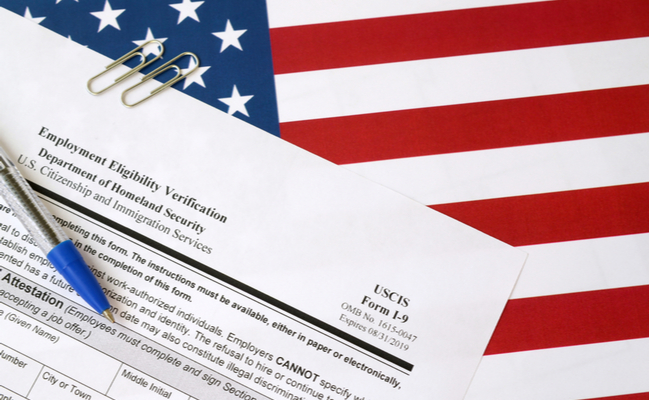Content in this post was informed by conversations with Senior Trial Attorney Liza Zamd from the U.S. Department of Justice Civil Rights Division’s Immigrant and Employee Rights Section. Click here to access the second post in this series, Overcoming Two Key Challenges when Communicating with Employers about Work Authorization.
To learn more on this topic, stream the webinar recording Refugees and Asylees Have the Right to Work, hosted in December 2020.
Social Security Delays & Employment Challenges
Service providers and clients around the nation continue to experience disruptions to early employment due to the impact of COVID-19. One important challenge has been the delay of documents often used to prove work authorization, particularly Social Security Cards. Despite the Office of Refugee Resettlement (ORR) and Bureau of Population, Refugees, and Migration (PRM) working with the Social Security Administration (SSA) to resolve these delays, many service providers are continuing to report that they have been unable to place clients in work due to this issue.
This situation has brought to light several misconceptions commonly held by both employers and service providers regarding work authorization. In this blog post, we’ll bust some common myths regarding work authorization and Social Security Numbers and Cards and share some key resources and learning opportunities. Click here to access a follow-up post on communicating with employers about these issues!
Fact #1: Not having a Social Security Number/Card does not disqualify refugees or asylees from beginning work.
You may have heard that refugees and asylees cannot begin work without a Social Security Number/Card. In fact, refugees and asylees can prove work authorization using any combination of documents listed on the USCIS Form I-9 (either one document from List A or a combination of one document from List B and one document from list C), and they do not need to have a Social Security Number to begin working.
For example, a refugee who has not yet received their Social Security Number/Card could present:
- An EAD card (Form I-766) as a List A document OR
- A valid I-94 document as a List A document.
Note: I-94 documents are sufficient for refugees to begin work for 90 days, but after those 90 days, the refugee must provide either an EAD card or a List B document and a Social Security Card.
On the other hand, an asylee who has not yet received their Social Security Number/Card could present:
- An EAD card (Form I-766) as a List A document OR
- A valid I-94 document as a List C document (that does not expire) AND a List B document, such as a valid photo ID.
These are examples of some options, but your clients may have other types of acceptable documents.
Employers may not realize that there is a distinction between: A) A client having enough documents to complete the Form I-9 and B) A client needing to provide a Social Security Number for E-Verify or payroll purposes. There are no Social Security Administration, IRS, or E-Verify rules that prevent people from working while they wait to receive their Social Security Number and/or Social Security Card. Therefore, if a client can satisfy Form I-9 requirements, they can work even though they are still waiting for a Social Security Number.
If an employer is demanding a Social Security Number/Card, they are breaking the I-9 rules (even if they don’t realize it). The best thing to do in these circumstances is to first see if you can resolve the situation on your own by providing accurate information and resources to the employer. If you are unable to resolve the situation on your own, the next step is to reach out to the Department of Justice Civil Rights Division’s Immigrant and Employee Rights Section (IER). The team at IER can help you and your employer partners understand the law and provide helpful resources and/or interventions when necessary.
As a way to respond to questions and offer support, the IER provides hotline numbers for workers (which you can also call) as well as employers. Calls can be anonymous and language services are available. The hotlines are open 9am-5pm ET, Monday-Friday.
- Employers: 1-800-255-8155
- Workers (and service providers): 1-800-255-7688
“We have used the DOJ hotline to inform [employers] and in fact the DOJ representatives really did a great job educating some of our employers. As a result, most of our employers understand and are willing to hire refugees before they get their docs.” – Nasr Saradar, Job Developer Coordinator, Nationalities Service Center (Philadelphia, PA)
Fact #2: Employers who use E-Verify can hire a candidate who is waiting to receive a Social Security Number/Card, and they have been given instructions on how to handle this situation.
Employers who use E-Verify may think that they cannot hire a candidate who is waiting to receive a Social Security Number/Card. Actually, the E-Verify contract that employers sign states that “The Employer agrees to become familiar with and comply with the most recent version of the E-Verify User Manual.” The most recent version of the manual (M-775 from April 2018) provides this guidance: “If a newly hired employee has applied for, but has not yet received an SSN (for example, the employee is a newly arrived immigrant), attach an explanation to the employee’s Form I-9 and set it aside. Allow the employee to continue to work and create a case in E-Verify using the employee’s SSN as soon as it is available.” Even if it is taking the worker several months due to the pandemic, the employer must still follow E-Verify rules and not run the worker until the SSN is issued. There is no deadline by when the worker needs to have an SSN. The worker also does not need to show the employer proof of having applied for an SSN (although, as noted in the quote below, some service providers have reported that this type of documentation, if available, can alleviate employers’ concerns).
“We have successfully placed two clients in jobs without their SS Cards. [We presented] letters from SSA showing they had applied for their SSN. With those employers, they recognized that they could hire our clients with the EAD or I-94, but [they were concerned that they would need a] SSN to complete e-Verify. We had the clients give the employer their receipt letter from SSA showing that they had applied for an SSN, told the employer that e-Verify allows them to set aside an employee’s I-9 and let them work if they are awaiting an SSN, then sent the employer the link to the specific section in the M-775 e-Verify user manual about how to handle clients who have applied for but not yet received an SSN.” – Monica Harris, Catholic Social Services of the Miami Valley (Dayton, OH)
Fact #3: In many cases, the hiring process can still move forward if employers require a Social Security Number for their online applications, background checks, or tax withholding paperwork.
The IER office at the U.S. Department of Justice has successfully helped many workers and employers resolve these kinds of process issues. In many cases, IER finds that employers are willing to make adjustments to their policies and procedures once they understand the situation of the candidate, the law as it pertains to the candidate, and appropriate workarounds for the issue at hand. For instance, an employer can input 000-00-0000 on a W-2, then just amend the W-2 when the worker gets the SSN. W-2s have to be amended from time to time for a variety of reasons and this is just one (for more guidance on applying for payroll without an SSN, see Publication 15 (2020), (Circular E), Employer’s Tax Guide, “Applying for a SSN”). Again, when you come across these “roadblocks,” the best thing to do is to call the IER hotline and get support!
Key policy to be aware of: The Equal Employment Opportunity Commission (the agency responsible for prosecuting discrimination based on race, sex, religion, etc.) has said in their national origin discrimination guidance: “A policy or practice of screening out new hires or candidates who lack a Social Security Number implicates Title VII if it disproportionately screens out work-authorized individuals of a certain national origin, such as newly arrived immigrants or new lawful permanent residents, and thus has a disparate impact based on national origin.”
Useful Resources
Finally, as you continue to navigate these complex issues, you may find the following resources helpful:
Federal Guidance Related to Documents and Document Delays
- SSN: Delays in Issuing SSNs to Aliens by the Social Security Administration
- SSN: Publication 15 (2020), (Circular E), Employer’s Tax Guide, “Applying for a SSN” (Provides instructions for payroll without SSN)
- EAD: Form I-9 Verification During EAD Production Delays Due to COVID-19
- I-94: Refugees and Asylees (Provides information for employers about refugee/asylee I-94s)
- I-9: DHS Announces Extension to I-9 Compliance Flexibility
- E-Verify: Temporary Policies related to COVID-19
- Hiring documents: Employment Rights and Resources for Refugees and Asylees (Provides a description for clients about payroll, Form I-9, and E-Verify)
Federal Guidance Related to Employment Rights
- U.S. Department of Justice: Refugees and Asylees have the Right to Work
- U.S. Department of Justice: Information for Refugee and Asylees about the Form I-9. (Translations available in Amharic, Arabic, Armenian, Burmese, Farsi, French, Karen, Kayah, Nepali, Russian, Simplified Chinese, Somali, Spanish, Swahili, Tigrinya, Ukrainian, Urdu)
- U.S. Department of Justice Employment Discrimination Flyer (Translations available in Arabic, Bosnian, Chinese, Farsi, Filipino, French, Haitian Creole, Hindi, Hmong, Korean, Punjabi, Russian, Spanish, Tagalog, Urdu, Vietnamese)
- U.S. Department of Justice: What you need to know about the Form I-9
- U.S. Department of Justice: Fact Sheet on IER and EEOC
- E-Verify: Training on I-9 and E-Verify










